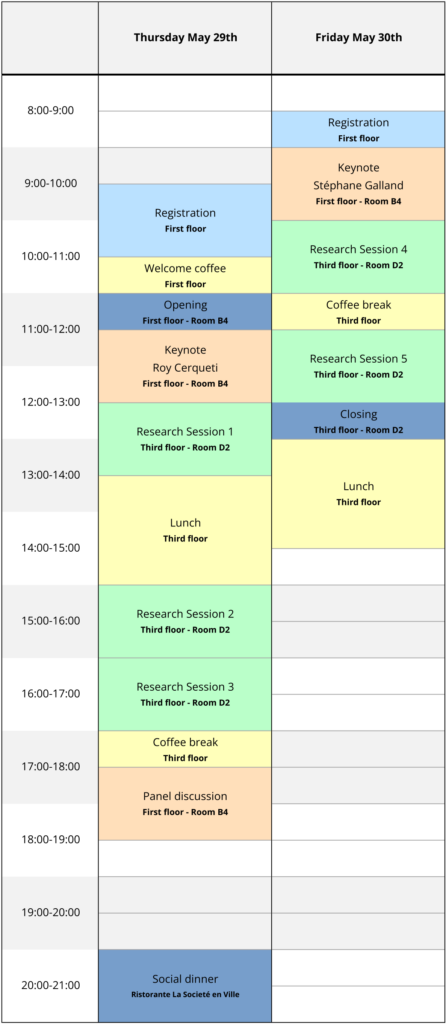
Keynotes
Thursday May 29th | 11:30 - 12:30 | First floor - Room B4
Regimes identification and data compression: problems and applications
Data Science is grounded on the remarkable availability of data. Such an abundance leads to unavoidable concerns related to managing large datasets. This talk enters this debate by providing some remarks on identifying regimes in the temporal datasets and exploring their stochastic structure. On this, we also discuss data compression frameworks, with special attention to the competing targets of maintaining the features of the original sample and pursuing a simplification of the considered sample. Models, applied contexts, and open problems will be highlighted.
Short bio: Roy Cerqueti (PhD) is Full Professor of Statistics at Sapienza University of Rome, Italy, Director of the Doctoral School in Social and Economic Sciences and Member of the Scientific Board of the Italian Association for Mathematics Applied to Social and Economic Sciences. He is also Research Affiliate of the GRANEM, a Research Center hosted by the University of Angers, France, and Distinguished Visiting Professor at the Royal Holloway University of London, UK. Previously, he was Professor of Mathematical Methods for Economics, Finance, and Operations Research at London South Bank University. He was also a review Panel expert in the COST Action Proposal Submission, Evaluation, Selection, and Approval procedure (appointment by the Italian Minister of University – Office of the National Coordinator of COST projects) from 2017 to 2019. He has published over 200 scientific articles, most of them in highly ranked international journals. He regularly participates in international conferences as an invited speaker. He has several editorial assignments and regularly performs referral services for many journals and scientific institutions. He has participated in research projects at a national and international level, also as Principal Investigator. He has carried out a broad teaching activity and has delivered invited seminars and courses at prestigious international universities. His current research focuses on data science, complex networks, management science, mathematical and statistical modelling, optimization, and their applications to economics, finance, and social science.

Friday May 30th | 9:00 - 10:00 | First floor - Room B4
From Artificial Intelligence to Multiagent systems – Application to Smart Cities and Oncology
This presentation presents the concepts Artificial Intelligence (AI) and explores the paradigm of Multiagent Systems (MAS) as a tool for modeling and supporting the implementation of complex systems. The ASPECS methodology and the SARL agent programming language will be shortly presented. Examples from smart cities and intelligent transport systems, as well as from oncology will be presented for illustration.
This presentation delves into the concepts of Artificial Intelligence (AI) and explores the paradigm of Multiagent Systems (MAS) as a powerful tool for modeling and supporting the implementation of complex systems. We will introduce the ASPECS methodology, a structured approach for designing and developing multiagent systems, and provide an overview of the SARL agent-oriented programming language, which facilitates the creation of sophisticated agent-based applications.
To illustrate the practical applications of these concepts, we will present examples from the domains of smart cities and intelligent transport systems. These examples will demonstrate how MAS can enhance optimize traffic management, and improve overall efficiency and sustainability in urban environments. Additionally, we will explore applications in the field of oncology, showcasing how AI and MAS can help in the determination of the therapeutic targets.
Short bio: Professor Stéphane Galland is an expert in Agent-oriented Software Engineering and Agent-based Simulation. He has made significant contributions to transportation, smart cities, and Industry 4.0. Prof. Galland co-created the ASPECS methodology, SARL programming language, and Janus agent framework. He has supervised numerous students, led major projects, and published extensively, including 36 international journals and 92 conference proceedings. His work includes 7 software patents and key roles in academic and industrial initiatives.

Panel discussion
Thursday May 29th | 17:30 - 18:30 | First floor - Room B4
Sfide e potenzialità di Big Data ed Intelligenza Artificiale nelle aree montane
Chair: Dr. Fabiola Megna
Speakers:
- Prof. Massimiliano Ferrara, University Mediterranea of Reggio Calabria
- Dr. Jean Marc Christille, Fondazione Clément Fillietroz ONLUS – Osservatorio Astronomico della Regione Autonoma Valle d’Aosta
- Dr. Davide Capello, Novasis Innovazione
Detailed program
Thursday May 29th
9:30 – 10:30 | Registration | First floor
10:30 – 11:00 | Welcome Coffee | First floor
11:00 – 11:30 | Opening | First floor – Room B4
11:30 – 12:30 | Keynote | Prof. Roy Cerqueti | First floor – Room B4
12:30 – 13:30 | Research Session 1: AI for Society and Institutions | Chair: Stefano Tedeschi | Third floor – Room D2
- DeepHazard: A Tensorflow/Keras and PyTorch-Compatible Deep Learning Package for Survival Analysis
Gianmarco Sabbatini, Lorenzo Manganaro - Some Recent Results from the Literature on Artificial Intelligence in Higher Education
Gloria Tamboroni, Stefania Monica, Federico Bergenti - Conflict Prediction in Public Administration: A Gender-Aware Evaluation
Sylvie Cerise
13:30 – 15:00 | Lunch | Third floor
15:00 – 16:00 | Research Session 2: AI Risk and Decision-Making | Chair: Giuseppe Caristi | Third floor – Room D2
- Data Poisoning and Artificial Intelligence Modeling: reflections on Learning processing and Cybersecurity
Massimiliano Ferrara - The FRAM/AHP hybrid model for risk assessment in the supply chain issue for management decision
Michael Morabito, David Barilla
16:00 – 17:00 | Research Session 3: AI for Sustainable Territories | Chair: Consuelo R. Nava | Third floor – Room D2
- Effectiveness of Social Media Public Branding Strategies: the Content Analysis of Facebook Posts of Italian Museums
Paola Riva - Data-Driven Insights into Mobility and Demographic Change in Alpine Municipalities: The Case of the Metropolitan City of Turin
Daniela M. Yáñez, Viktoriia Tomnyuk, Giuseppe Varavallo, Andrea Membretti - Topic and Sentiment Analysis for Understanding Territorial Identity: a Case Study of the Lower Aosta Valley
Sylvie Cerise, Consuelo R. Nava, Alessandro R. Novallet, Stefano Tedeschi
17:00 – 17:30 | Coffee Break | Third floor
17:30 – 18:30 | Panel Discussion | First floor – Room B4
20:00 – 22:30 | Social dinner @ Ristorante La Société en Ville
Friday May 30th
8:30 – 9:00 | Registration | First floor
9:00 – 10:00 | Keynote | Prof. Stéphane Galland | First floor – Room B4
10:00 – 11:00 | Research Session 4: Statistical Challenges in AI | Chair: Roy Cerqueti | Third floor – Room D2
- “Double AI” for Sustainable Tourism: Artificial Intelligence and Alpine Innovation for a Sustainable Future [Online presentation]
Stefania Cerutti - The Perils of the MoB. The Use of Month of Birth as an Instrumental Variable in Causal Investigations
Roberto Leombruni, Sonia Della Monica - Land Use changes in the Alpine Area of Lombardy
Luca Patelli, Paolo Maranzano, Daniele Toninelli
11:00 – 11:30 | Coffee Break | Third floor
11:30 – 12:30 | Research Session 5: Big Data AI Applications in Mountain Regions | Chair: Massimiliano Ferrara | Third floor – Room D2
- AI-Driven CAD for Histological Analysis in Mountain Regions: Advancing Local Healthcare and Sustainable Development
Matteo Calabrese, Chiara B. Salvemini, Michela Assale, Stefano Sartor, Roberta Patetta, Laura Caramanico, Andrea Cavalli, Stefano Gustincich, Jean Marc Christille - Monitoring cryospheric environment at a regional scale: big data from sensor networks and experimental AI applications in the framework of the Glarisk-cc FESR project
Fabrizio Troilo, Martina Lodigiani, Maddalena Nicora, Luca Mondardini, Paolo Perret, Jean Marc Christille, Matteo Calabrese, Chiara B. Salvemini, Stefano Sartor - Analysis of Italian waste management data via non-stationary signal analysis methods [Online presentation]
Roberto Cavassi, Antonio Cicone, Aamir Javed, Enza Pellegrino, Agnese Rapposelli - Big Data-Enabled Predictive Models for Sustainable Extreme Weather Forecasting in Mountainous Regions [Online presentation]
Opeyemi Bilqees Adewusi, Opeyemi Oluwagbenga Owolabi, Funmilayo Arinola Ajayi
12:30 – 13:00 | Closing | Third floor – Room D2
13:00 – 14:30 | Lunch | Third floor